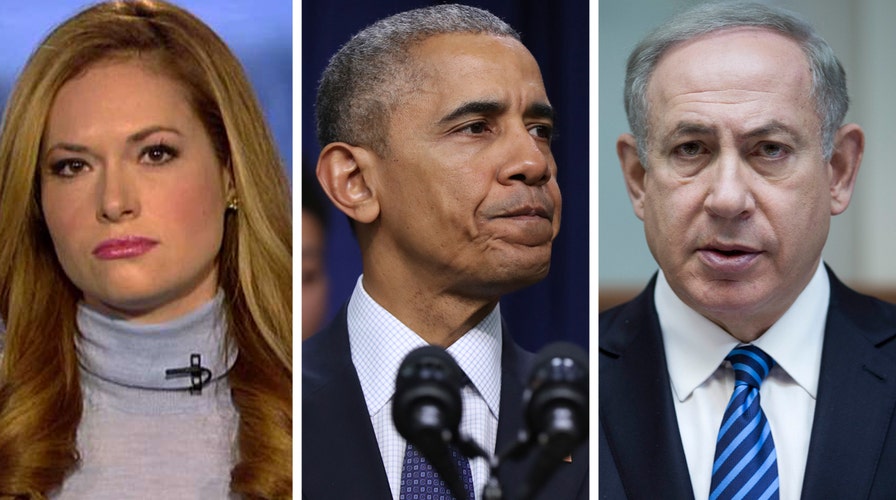Israeli Prime Minister Benjamin Netanyahu summoned the American ambassador Sunday to protest the Obama administration’s role in allowing an anti-settlement resolution to pass the U.N. Security Council, as his government accused the U.S. of helping orchestrate the vote.
According to The Wall Street Journal, U.S. ambassador Daniel Shapiro was called to the prime minister’s office where he was told the resolution would not help the peace process.
“Acts such as these hinder peace and [do] not promote it. That was the message,” an Israeli official told the Journal.
The U.S. abstained in Friday’s vote, allowing the council to approve it. The Israeli foreign ministry reportedly also summoned diplomats from 10 of the 14 countries that backed the resolution.
The mounting tensions over Friday’s proceedings have sent already-frosty ties between the Obama and Netanyahu governments to their lowest level yet. The rare summoning of the American ambassador was only the latest flare-up.
On Sunday, Israel’s government also accused the U.S. of pulling the strings in last week’s dramatic developments.
“We have rather ironclad information from sources in both the Arab world and internationally that this was a deliberate push by the United States and in fact they helped create the resolution in the first place,” Netanyahu spokesman David Keyes said on Fox News’ “America’s News HQ.”
Netanyahu made similar claims during a meeting with cabinet ministers.
White House spokesman Eric Schultz, though, issued a statement Sunday defending President Obama's support for Israel and stressing that the U.S. did not draft the resolution.
“The US did not draft this resolution nor did the US introduce this resolution,” he said. “The Egyptians, in partnership with the Palestinians, are the ones who began circulating an earlier draft of the resolution. The Egyptians are the ones who moved it forward on Friday. And we took the position that we did when it was put to a vote."
The White House already has acknowledged Obama made the decision for U.S. Ambassador Samantha Power to abstain. Unclear was how involved the Obama administration was in crafting and pushing the resolution itself – which initially was put forward by Egypt, and then pursued as well by New Zealand, Malaysia, Senegal and Venezuela.
Netanyahu told his cabinet on Sunday that while the U.S. and Israel for decades had disagreed on settlements, they had an understanding that such action before the U.N. Security Council would make peace negotiations harder.
“As I told [Secretary of State] John Kerry on Thursday, friends don’t take friends to the Security Council,” Netanyahu said.
He pointedly said he looks forward to working with the new Donald Trump administration when it takes office next month. He said he was encouraged by Israel’s “friends in the United States” who criticized the resolution, saying “they understand how reckless and destructive” it is.
Netanyahu said Israel also was considering a "plan of action" against the U.N., without elaborating.
"We will do all it takes so Israel emerges unscathed from this shameful decision," Netanyahu said.
The resolution itself condemned Israeli settlement activities in the West Bank and east Jerusalem.
The resolution's immediate impact appears to be largely symbolic, but Israel fears it could open the door to an increase in international steps, including economic measures. Much of the international community considers the settlements illegal or illegitimate and an obstacle to peace.
President-elect Trump had intervened last week after the Israelis reportedly appealed to him for help. Trump came out against the resolution but, after a vote was delayed, the Security Council went ahead with consideration and approved it on Friday.
Trump tweeted afterward: “Things will be different after Jan. 20.” He later tweeted that the vote "will make it much harder to negotiate peace." But, he added, "we will get it done anyway."
Kerry said Israel’s continued and stepped-up attempts to build more settlements in the region, which includes East Jerusalem, risks the so-called “two-state” solution between Israelis and the Palestinians, who also lay claim to the region.
“The United States acted with one primary objective in mind: to preserve the possibility of the two state solution, which every U.S. administration for decades has agreed is the only way to achieve a just and lasting peace between Israelis and Palestinians," Kerry said Friday. “Two states is the only way to ensure Israel's future as a Jewish and democratic state, living in peace and security with its neighbors, and freedom and dignity for the Palestinian people.”
The Associated Press contributed to this report.













































